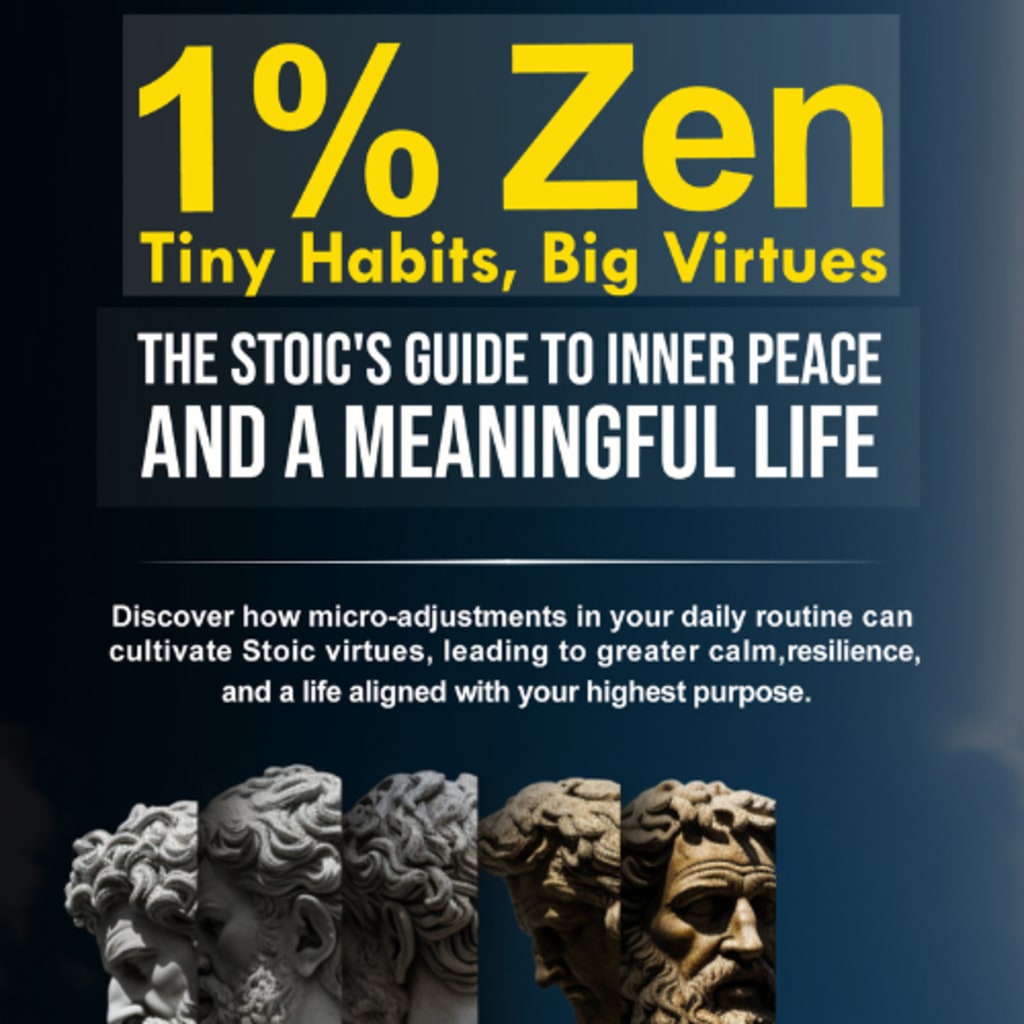How to Establish 1% Daily Self-Care as a STOIC.
The Stoic Guide to Inner 1% Zen

Establish 1% Daily Self-care as a Stoicism
Introduction Stoicism is an old Greek philosophy that stresses virtue in individuals, overcoming hardship with fortitude, and achieving inner peace by exercising restraint and accepting the things we cannot alter. Fundamentally, stoicism embraces the unpredictable nature of the outside world while encouraging people to concentrate on the things they can control, such as their ideas, attitudes, and behaviors. Stoic philosophy acknowledges that life is full of obstacles and unknowns, but instead of letting them overcome them, people may build mental toughness by incorporating justice, bravery, temperance, and reason into their lives. We see similarities between gradual progress and Stoic philosophy when we think about incorporating these ideas into regular self-care practices. Small, regular acts add up to meaningful long-term outcomes, according to stoicism. This is in line with the idea that we should modify our self-care routines in small, doable steps to attain general well-being. In self-care, we may concentrate on manageable factors, such as our food habits, sleep patterns, stress management, and alcohol use, realizing that these are areas where we have direct effects, much as Stoicism encourages us to focus on what we can control. People might approach self-care as a series of manageable incremental steps rather than as a daunting overhaul by adopting the Stoic idea of steady development. Stoic self-care, for example, can entail committing to one little adjustment every day or every week, such as choosing water over sugary beverages or adding more vegetables to meals, rather than trying to make a drastic nutritional overhaul overnight. This strategy is consistent with the tenets of stoicism, which emphasize living in the present and choosing actions that are under one's direct control. Essentially, the comparison between daily self-care and stoicism highlights the transformational potential of little, continuous gains. It pushes people to embrace an attitude that prioritizes ongoing development above quick perfection, creating long-lasting adjustments.
To start " How to Establish 1% Daily Self-Care as a STOIC"
The 1% Philosophy in Self-Care The goal behind the "1% philosophy" in self-care is to enhance one’s routines or habits gradually and subtly. It is predicated on the idea that minor, persistent adjustments—as little as 1% every day—can result in major, long-lasting gains in general well-being. The phrase "1% philosophy" refers to a dedication to consistently making little improvements or modifications. Even while these adjustments appear little at first, they add up over time to have a major impact. This strategy supports the notion that making little, controllable changes over time is frequently more sustainable and feasible than making large, abrupt changes all at once. Why is 1% important? The cumulative effect of the 1% concept is what makes it significant. Even though a 1% improvement might not seem like much at first, over days, weeks, and months, the cumulative effect of these tiny gains can produce amazing changes. Think about the financial example of compound interest: modest changes in self-care practices over time compound to build a healthier and happier lifestyle, just as a modest sum of money spent regularly over time rises dramatically due to compounding. The 1% method also has psychological advantages. It lessens the overload that frequently follows significant lifestyle changes. Greater objectives are more attainable and sustained when broken down into smaller, more doable steps. This lowers the risk of burnout or stopping self-care routines. If people concentrate on little steps, they will be more likely to maintain these changes over time, which will give them a feeling of empowerment and success when they see the slow but noticeable gains in their health and well-being. In the end, the significance of the 1% philosophy in self-care lies in its emphasis on the ability of constancy, endurance, and patience to bring about long-lasting beneficial transformations. This encourages people to go on their road of self-improvement with reasonable and attainable objectives.
Healthier Eating Habits Mindful Nutrition
Recognizing Nutritional Requirements: Learn about the various foods' nutritional content. Prioritize eating a well-balanced diet that includes whole grains, fruits, vegetables, lean meats, and healthy fats. Portion Control: Pay attention to serving sizes to prevent overindulging. Recognize your signs of hunger and fullness to control how much food you eat. Avoiding Processed Foods: A well balanced diet which is high in fiber and low in fat will provide the fuel your body needs while minimizing the risk for cardiovascular disease, cognitive decline and other metabolic syndromes. Limit your intake of highly processed and sugar-laden meals. Stoic way; you are encouraged to read food labels for content and it is important to keep caloric fat content to less than 20% of total calories. Look for Fat Free and No Cholesterol. Choose nutrient-dense, entire, unprocessed foods.
Hydration: Make sure you are well hydrated by consuming water throughout the day. Implementing Changes: with "Gradual Shifts"; Begin with little adjustments. For example, add coconut water to cranberry juice,add a fruit or a serving of veggies to one meal a day. Meal Planning: Arrange your meals in advance to guarantee a healthy, well-balanced diet. Incorporate a range of meals to fulfill various dietary requirements.
Cooking at Home: To have greater control over ingredients and cooking techniques, prepare meals more frequently at home. Mindful Eating Practices: Take your time, enjoy every bite, and be aware of your emotions while you consume different meals.
Maintaining a Food Journal: Record your meals to better understand your eating patterns and pinpoint areas for development. People may make the shift to healthy eating habits without feeling overwhelmed if these adjustments are made gradually. Recall that progress, not perfection, is the aim. In the process of making these adjustments to a healthy lifestyle, acknowledge your little accomplishments along the way and practice self-compassion.
Prioritizing Adequate Sleep Getting enough sleep is essential for general health and well-being. The brain needs rest to be creative, heal the body and rejuvenate. Quality sleep is important to revitalize our physical and emotional engines. The body heals while it sleeps. Sleep is essential for many areas of both mental and physical functioning.
The function of sleep 1. Restoration and Repair: Sleep promotes general physical health by enabling the body to renew and repair tissues. Cognitive Function: Getting enough sleep improves focus, output, and cognitive functions including learning and remembering. Emotional Well-Being: Sleep affects emotional stability and mood management. Immune Function: Getting enough sleep helps maintain a strong immune system, which helps people avoid and recover from illnesses.
Methods to Improve Your Sleeping Patterns: 1. Maintain a Regular Sleep Schedule: Even on weekends, keep a regular sleep schedule by going to bed and getting up at the same time every day. Establish a Calm Bedtime Routine: Read, do some light stretching, or practice meditation before bed to let your body know it's time to unwind. Optimize Your Sleep Environment: Make sure your bedroom is quiet, dark, and at a temperature that is pleasant for sleeping in. Minimize Screen Time: Because blue light from screens might interfere with sleep patterns, limit your time spent using them (TVs, PCs, and phones) at least an hour before bed. Mindful Eating and Drinking: Steer clear of large meals, coffee, and a lot of beverages just before bed to avoid discomfort or numerous nighttime awakenings. Regular Exercise: Get your body moving regularly, but steer clear of strenuous exercise right before bed because it might be stimulating
Through persistent application of these tactics, people can develop improved sleep patterns. Making sleep hygiene a priority can help you get deep, rejuvenating sleep, which is crucial for your general health and well-being.
Moderation of Alcohol Use The goal of moderation in alcohol use is to restrict alcohol intake to minimize any potential harmful effects on health while drinking it in a regulated and responsible manner. It's critical to comprehend the effects on health and put moderation techniques into practice: Consequences for Health: Physical Health: Drinking too much alcohol can damage the liver, cause heart problems, impair immunity, and raise the chance of developing certain malignancies. Mental Health: Problems with memory, anxiety, and sadness can all be exacerbated by alcohol abuse. Behavioral Impact: It may cause errors in judgment, coordination, and decision-making, which may result in mishaps, injuries, and dangerous conduct. Techniques for Moderation: 1. Setting limitations: Clearly define your weekly or occasion-specific alcohol consumption limitations and adhere to them. Switching Drinks: To cut down on total intake, switch out alcoholic beverages with nonalcoholic ones (such as mocktails or water). Mindful Drinking: Pay attention to beverage serving quantities and alcohol content. Select less-alcoholic substitutes or diluted beverages. Pacing and Sipping: Take pauses between drinks and sip carefully to slow down the rate of consumption. Preventing Binge Drinking: To prevent bouts of binge drinking, limit the amount of beverages you consume in one sitting. The stoic way is moderation.
Seeking Support: To properly control alcohol intake, if moderation is difficult, ask friends, family, or professional resources for assistance. People may enjoy alcohol responsibly while reducing the possible health hazards connected with excessive drinking by putting these moderation measures into practice. Choosing wisely when it comes to alcohol use is essential to preserving general health and well-being.
Stress Management Techniques A variety of approaches are included in stress management techniques, to minimize stress and manage it to support mental and emotional health. Acknowledging stress and using stoic stress reduction techniques might be helpful: Identifying Stress: Physical symptoms: Be mindful of any bodily indications of stress, such as headaches, tense muscles, exhaustion, or changes in appetite. Emotional indicators: Identify irritation, anxiety, overload, or mood swings as stress-related symptoms. Behavioral Signs: Recognize any behavioral changes that can be brought on by stress, such as greater procrastination, social disengagement, or trouble focusing.
Techniques for Stress Management: Mindfulness and Meditation: To encourage relaxation and lower stress levels, engage in mindfulness exercises or meditation. Regular Exercise: Getting moving can help you feel better and release endorphins, which are known to reduce stress. Deep Breathing Exercises: When faced with stressful conditions, engage in deep breathing exercises to help relax the body and mind. Time management: To lessen feelings of overload, arrange work, establish priorities, and divide more difficult jobs into smaller, more doable ones.
Healthy Lifestyle Decisions: To enhance general well-being, emphasize getting enough sleep, have a balanced diet, and minimize sugar and caffeine intake. Social Support: To lessen feelings of loneliness, ask friends, family, or a support network for help in sharing emotions and experiences.
Stoic Methods for Handling Stress: Pay Attention to What You Can Control: Put the tenets of stoicism into practice by concentrating on controlling your reactions to stress rather than attempting to influence outside events. Develop Acceptance: Acknowledge the things you cannot alter while working to modify your viewpoint and how you respond to pressures. Maintain Perspective: Reframe stressful events by using reason and taking the wider picture and long-term effects into consideration. Practice Gratitude: Develop an attitude of thankfulness for what you have by turning your attention from worries to admiration. People may build a robust attitude and useful coping strategies to handle stressful situations by fusing standard stress management techniques with Stoic ideas. This promotes mental and emotional well-being in the process.
Implementing Stoic Self-Care Daily: Including Stoic ideas into your daily routine can help you develop a mentality that is centered on your development and well-being. This is known as daily Stoic self-care. This entails creating regular routines and overcoming obstacles that might prevent the adoption of certain practices:
Applying Daily Stoic Self-Care- Morning contemplation: Start the day with a little meditation or contemplation, concentrating on stoic ideas like acceptance, thankfulness, and the significance of what you can manage.
Setting Intentions: Make plans or objectives for the day that are in line with the Stoic virtues, with a focus on qualities like justice, wisdom, bravery, and temperance.
Mindful Actions: Consciously apply stoic principles to decision-making and interpersonal relationships by engaging in mindfulness practices throughout the day.
Evening Reflection: Examine how successfully the Stoic principles were used during the day and note any areas that might need improvement. Establishing Daily Routines: Reading about Stoicism or Journaling: Set aside time to read about Stoicism or to write in your diary about ideas and observations that are sparked by Stoic teachings. Mindful Practices: Include brief Stoic affirmations, deep breathing techniques, or mindfulness exercises in your daily routine. Physical Activity: Include physical activity as opportunities to practice stoic awareness, such as walks, yoga, or exercise.
Overcoming Obstacles, Consistency: Incorporate self-care rituals into regular routines to maintain your commitment to everyday activities in the face of distractions and hectic schedules. Some of the ways to achieve 1% wellness and good health is by having fun! Engage in some activity on a daily basis for your own self-enjoyment. Remember , the most important person in the world is YOU. Overcoming Obstacles: Recognize that failures are a necessary part of the journey and embrace adaptability and flexibility. Discuss and confront those issues which cause stress in your life. Only by apply stoic thinking to overcome obstacles you take charge of your Self-Care! Seeking Support: Find a community that is encouraging and accountable, or ask mentors, stoic philosophy clubs, or other resources for advice. Engage in physical outlets to vent those energies. If necessary, discussing these stressors with a professional may help you gain control and reduce stress. Self-Compassion: Show yourself patience and self-compassion, realizing that following the Stoic principles and improving oneself will take time. Meanwhile, don't smoke as smoking is the #1 cause of premature death and disability. People may employ the knowledge of stoicism to improve everyday life by implementing stoic concepts into daily routines and taking a proactive approach to conquering obstacles. This will help people develop a resilient attitude and a greater feeling of well-being.
Conclusion: The article concludes by highlighting the enormous benefits of incorporating Stoic ideas and adopting the 1% philosophy in self-care. It exhorts readers, supported by the insight of stoicism, to start their journey toward self-care with modest, doable adjustments. People may create the conditions for long-term well-being and a more meaningful existence by making small, deliberate changes and adopting a stoic mentality.
References Rutherford, R B, The Meditations of Marcus Aurelius a Study (Oxford, 1991; online edn, Oxford Academic, 31 Oct. 2023), https://doi.org/10.1093/oso/9780198147558.001.0001, accessed 19 Dec. 2023. [1] [2] T. Weaver, How To Build A Daily Stoic Routine?, Orionphilosophy.Com. (2023). https://www.orionphilosophy.com/stoic-blog/how-to-build-a-daily-stoic-routine. T. Weaver, Epictetus’ Handbook: Using the Enchiridion for Daily Life, Oionphilosophy.Com. (2023). https://www.orionphilosophy.com/stoic-blog/epictetus-theenchiridion.
Dearest Reader, Please download and read this book. I would be incredibly grateful if you could consider leaving a review online. Hearing from you,whether it's simply say "hello" helps us all to connect with readers who make this journey worthwhile. Please, consider a subscription to support other writers on this platform. With sincere gratitude! take very good care of yourself the " STOIC" way. MUCH LOVE!
About the Creator
Rosemary Ingado, PA ( Physician Associate/ Physician Assistant)
I am not just a regular Physician Associate. My stethoscope picks up more than heartbeats. Want to hear what else? Download this 30 mins short read below :-
Enjoyed the story? Support the Creator.
Subscribe for free to receive all their stories in your feed. You could also pledge your support or give them a one-off tip, letting them know you appreciate their work.






Comments (1)
Here are some short reads to incorporate Stoicism in Your Daily Life 1) Growing Through Grit, Unveiling Stoic Life https://a.co/d/iRN1fSe 2) 1% Zen, Tiny Habits; Big Virtues. https://a.co/d/dWsAVIS